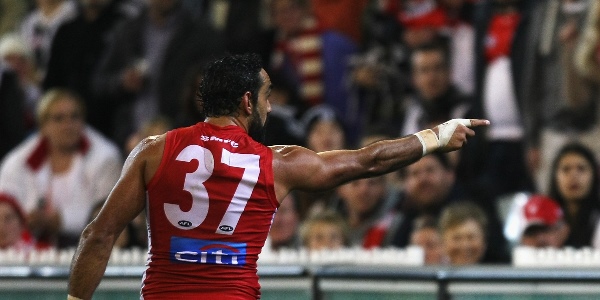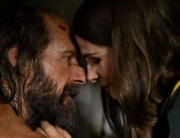
Adam Goodes points into the crowd alerting security to comments made during a May 2013 match in The Australian Dream (Andrew White/AFL Media/TIFF)
If sports serve as a microcosm of contemporary society, director Daniel Gordon’s arresting and alarming documentary scrutinizes racism on the football field and throughout Australian culture, as experienced by one of the country’s star players.
For viewers who have not followed the saga of Adam Goodes, one of the most lauded athletes of his generation, Gordon provides thorough background on his transformation from sports star to an Aboriginal activist who faced a huge wave of contempt from spectators for simply stepping foot onto the green. At its best, the film zeroes in on the history of the country’s founding by the British and its impact on the Indigenous population; indeed, it was not until 1967 that they officially became citizens.
Other recent feature films have plunged into the dark chapters of the country’s colonization, including The Nightingale from last year and Sweet Country (2017). Gordon also takes a historical but an in-depth approach that is essential in exploring the country today, which elevates the film, even if you don’t know exactly how Australian football differs from soccer or rugby (it appears to this viewer as a combination of the two).
The interview subjects look directly into the camera lens; the result is upfront and conversational. The son of an Aboriginal mother and an Irish-Scottish father, Goodes assimilated through athleticism, according to his voice-over, but he was not in touch with his mother’s heritage. She was among the stolen generation, children who were taken away from their parents at a young age—in her case, at age six—to be educated at a boarding school as part of the government’s policy of forced assimilation.
Adding richness to the documentary are the accounts of other Aboriginal athletes: footballer Nicky Winmar, who in the early 1990s, became an iconic figure for standing up to taunts from the crowds. He lifted his jersey up, proudly displaying and pointing to the color of his skin. That incident, in turn, led one sports commentator, Sam Newman, to criticize Winmar’s sudden cancellation on a televison program: he appeared as Winmar in blackface. Meanwhile, Nova Peris, an Olympic gold medalist in women’s hockey in 1996, was the target of a racial slur by one of her teammates in front of the rest, who said and did nothing.
In May 2013, a racist incident involving Goodes galvanized the country. During a match, Goodes heard a shout from the stands, “Goodes, you’re an ape.” The culprit was a 13-year-old girl. Goodes left the field and refused to play until the instigator was escorted out of this stadium. He was later conciliatory toward the teen, offering to take her phone call and accept her apology. But a backlash began from defenders of the youth, decrying that the girl was detained for hours without a guardian and labeling Goodes as a bully on social media. Among his critics was Andrew Bolt, a tone-deaf talking-head commentator who focused his criticism on Goodes’s behavior, placing responsibility on the athlete for the vitriolic reactions that ensued. Besides Bolt’s statements, the film offers plenty of jaw-dropping, racially insensitive statements on television and radio sports shows and, of course, Twitter.
Other interviewees scrutinize the backlash, counter-backlash, and the effects of casual racism, as it’s described by sports journalist Tracey Holmes. Often this is at the expense of a tight edit. Many of the quotes heard throughout the introduction are repeated later on, and as the movie hits the 90-minute mark, much of the sentiments and information becomes repetitive. Nevertheless, this is an essential film on race and sports, and of the emotional and professional cost of a person of color speaking up and taking a stand. Viewers outside of Australia will find much here that pertains to professional sports in their own countries, too.






Leave A Comment